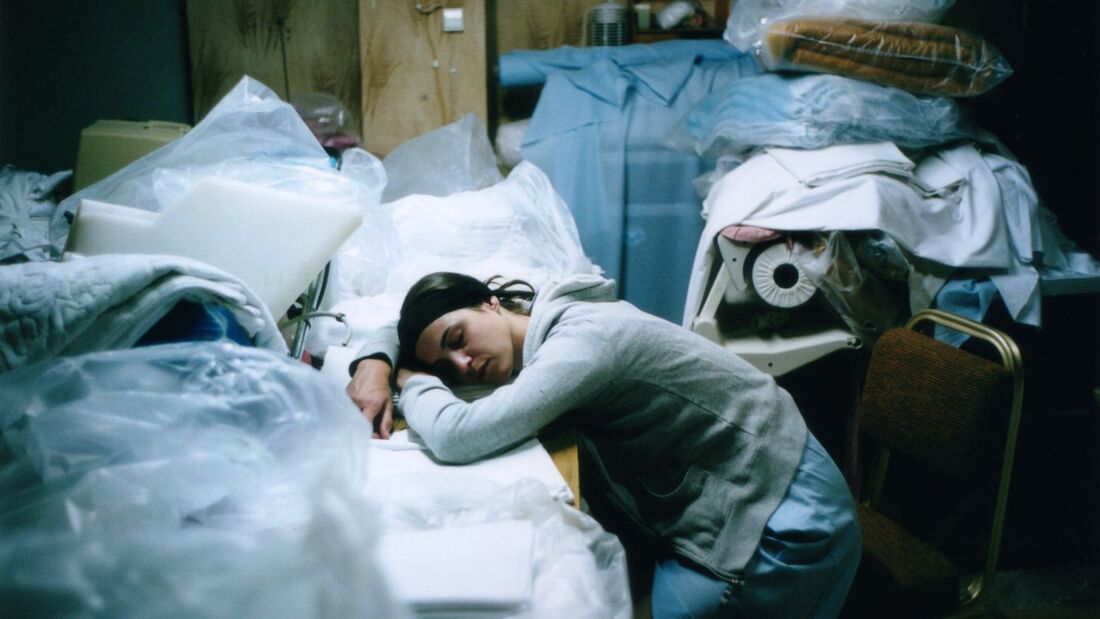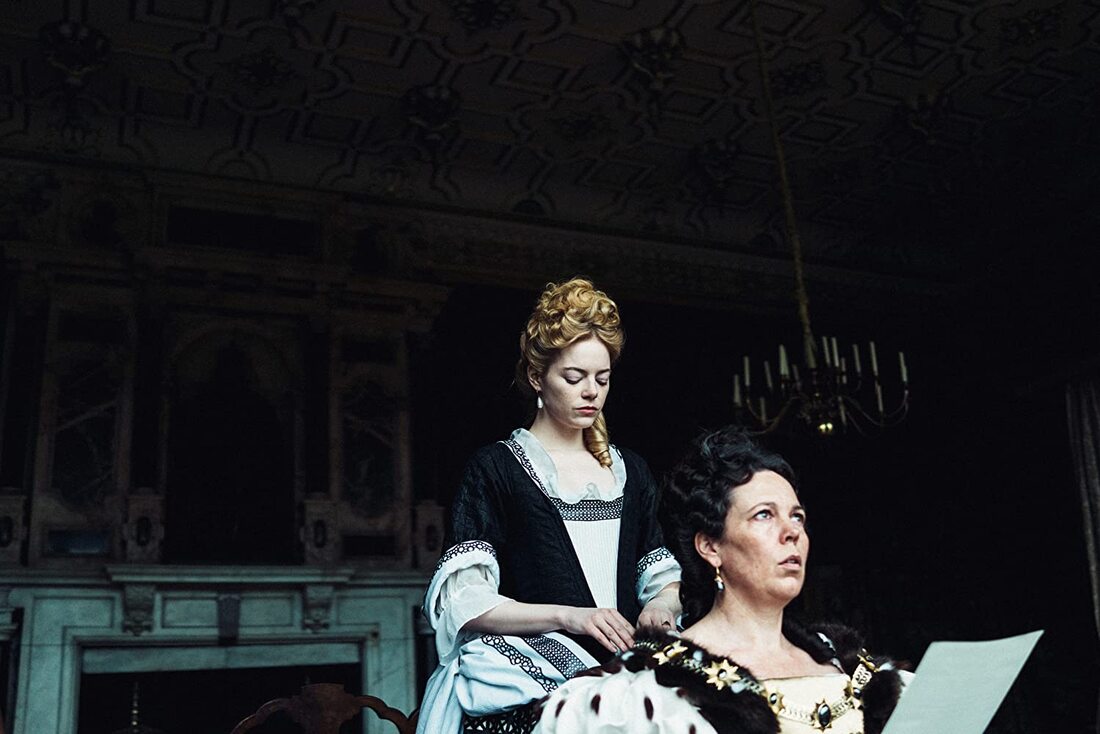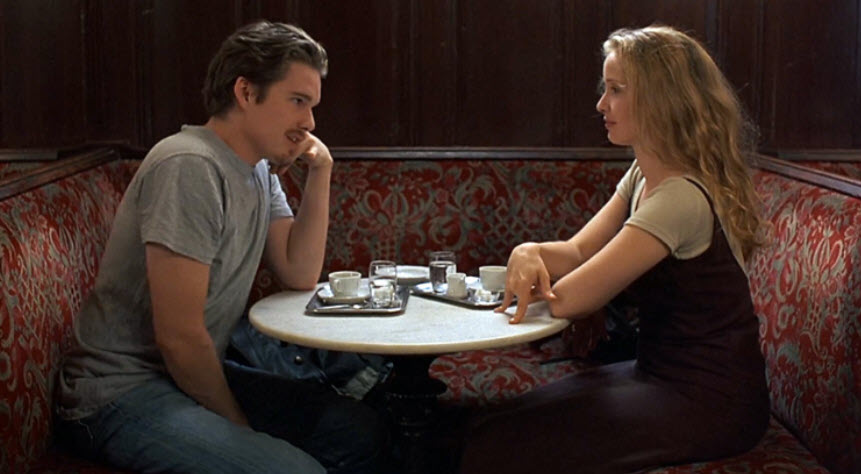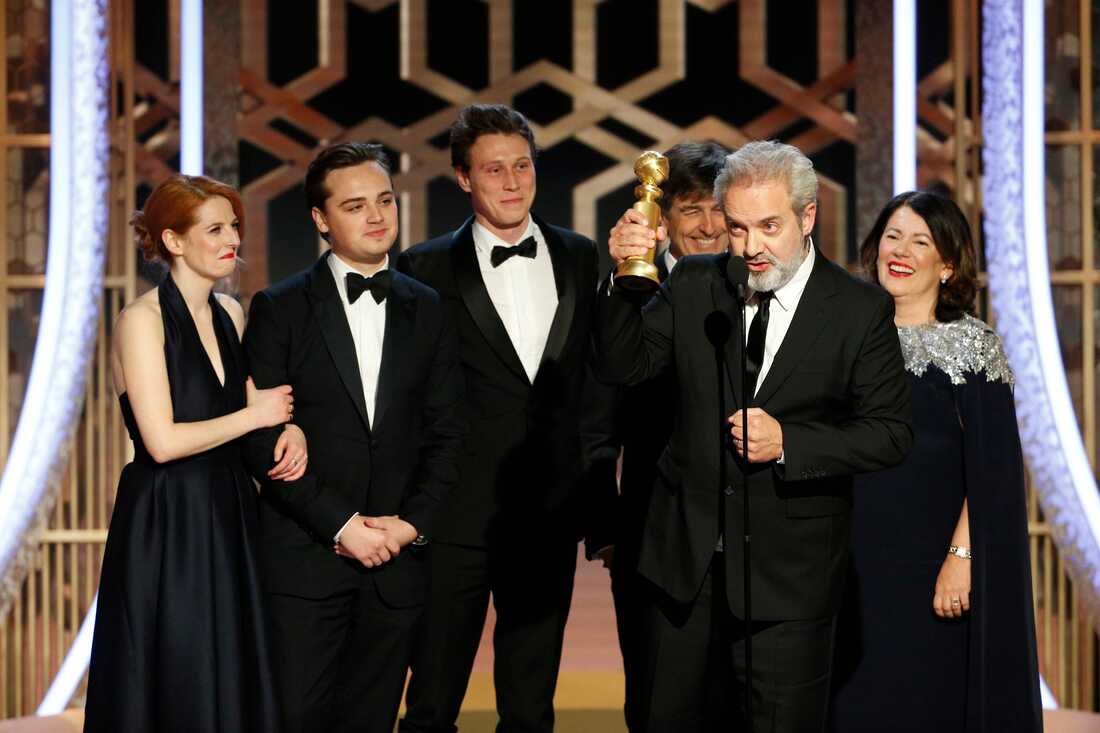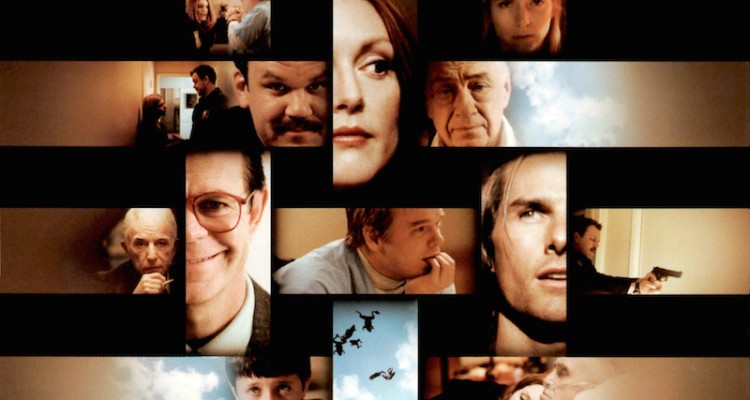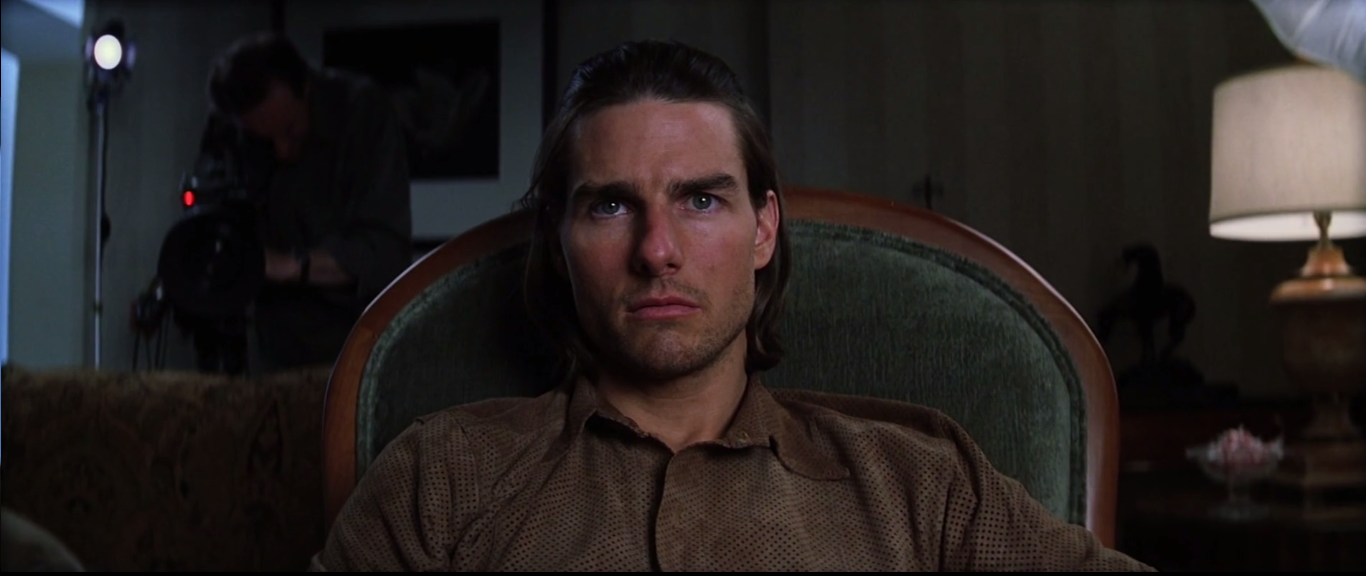|
By Camden Ferrell
Disclaimer: Heavy spoilers for The Lobster, The Killing of a Sacred Deer, and The Favourite.
Yorgos Lanthimos is one of the most prominent and distinctive directors working today. This 3-time Oscar nominee directed his first solo feature in 2005, Kinetta. Since then, he has directed some intriguing Greek cinema like Dogtooth and Alps before transitioning to English language films. His style has always been a distinctive one. You can always find traces of his previous films in every new movie he directs, and it gives each film a sense of thematic and stylistic connectivity. For this piece, we will be mostly focused on his three most recent features, The Lobster, The Killing of a Sacred Deer, and The Favourite. Between these three films, Lanthimos thoroughly explores the ideas of shared emotion, decision making, and looming uncertainty. 2015’s The Lobster holds a special place in my heart and history as a cinephile, and a lot of this comes from the way Lanthimos highlights the aforementioned concepts. In this satirical look at modern dating culture, David is sent to a hotel where he must find a partner in 45 days, or he will be turned into the animal of his choice. After many failed (albeit darkly comical) exploits, David defects from the hotel to join a group of loners. There, he meets the Short-Sighted Woman and falls in love with her. This contrast between the true love they share and the fake love he had for other women in the film is what gives the movie an emotional core. It explores the idea of what it means to love, but he takes it a step further by showing the decisions that are made as a result of shared emotion. However, with every decision, the audience as well as the characters question the choice, and it creates a subtle sense of unease and uncertainty that define Lanthimos’s later works. By the end of the film, we see David and the Short-Sighted Woman, who is now blind, leave the loners to start a new life. However, in a society where couples must share a common trait, David stands in the bathroom with a knife held scarily close to his eye, unsure of whether or not to blind himself. This ambiguity makes The Lobster such a moving yet deeply unsettling film, and it’s an ending that Lanthimos has perfected throughout his career. In his follow-up feature, The Killing of a Sacred Deer, he explores similar ideas in a much more sinister way. Steven, a successful surgeon, encounters a boy named Martin. We learn that Martin’s father died during surgery ten years prior when Steven was drunk and operating. Martin says that in order to restore balance, Steven must kill a member of his family, either his wife, son, or daughter, or they will all slowly get sick and die. Lanthimos has a strange way of horrifying the audience with this disturbing premise while also infusing some of his own visual and comic style. The main emotions in this movie are fear and paranoia. This is shared amongst all the family members as they are unsure of how to proceed in this difficult situation. This paranoia compels Steven’s wife to perform a sexual act on one of his former colleagues to get to the bottom of the situation. Each kid tries to convince their father in many ways to spare their lives, and Steven is driven to kidnapping and assault in this ordeal. Many crucial decisions are made, and each one leads to more problems as they are guided by each of their shared emotions. After Steven finally kills one of his family members, the movie ends on a solemn and somber note. While it’s not ambiguous like The Lobster, the end still leaves the viewer disturbed, distressed, and wondering if the character’s choices were the correct ones.
In his most recent film, 2018’s The Favourite, Lanthimos once again revisits these central ideas and themes. Even though he didn’t write this film, he infused plenty of his own style into the film. In this 18th century love triangle, Queen Anne of England is in love with her friend Lady Sarah, but when Sarah’s cousin Abigail comes to be a servant, Anne and Abigail begin their own relationship. Throughout the film Sarah and Abigail continuously try to win the Queen’s favor, and this leads to escalating hijinks and deceptions throughout the film. While a lot of the movie is led by the character’s love for Queen Anne, another element is their feelings of jealousy and vulnerability, and their continuous need to have the last laugh. Lanthimos does a great job at focusing on all the decisions that are made by these emotional characters and reflecting on all of the consequences. Instead of having uncertainty course through the entire movie like his previous works, he opts instead to let that uncertainty nail the audience in the film’s final moments. After all of the character’s decisions, we know who the titular favorite is, but in the end the character questions if that’s what they even want anymore. It’s a brilliant ending that is so effective due to the execution of Lanthimos and his implementation of the skills he developed in his career.
Lanthimos is a multi-faceted director, but there are still unifying factors in every movie he makes, and this can be traced back all the way to Kinetta. He is phenomenal at creating emotionally developed characters and exemplifying the innate uncertainty that accompanies every decision in his movies. He has proven to be an influential and significant director in modern cinema, and this is seen through the way he uniquely makes his films. Yorgos Lanthimos’s solo debut, Kinetta, is now streaming on Criterion Channel.
0 Comments
by Camden Ferrell Before Sunrise was released in theaters 25 years ago, and since then, it has risen the ranks as one of the most poignant modern love stories. Richard Linklater has never strayed from exploring the human condition and what it means to connect with someone, and this film is a testament to his ability as a filmmaker. This is a movie that captures two people falling in love in an achingly beautiful way, and it has aged gracefully. The premise of this movie is incredibly simple. Two people, Jesse and Celine, meet on a train and engage in a nice discussion. As Jesse is about the leave the train, he asks Celine to leave and spend the day with him. Surely enough, they both leave the train and spend an unforgettable day together where they learn more about each other and themselves. It’s a story that is propelled by the interactions of its characters, and it doesn’t rely on any gimmicks or major plot devices to remain thoroughly charming and entertaining. The script is penned by Linklater and Kim Krizan with some uncredited help from both lead actors. This collaboration makes each character feel unique and properly developed in their mannerisms and actions. What’s so remarkable is how much of ourselves we see in these characters, and it makes their journey feel especially personal. The dialogue doesn’t force insight or humor, it lets all of its topics and discussion arise naturally in way that is evocative of real life. This film is led by Ethan Hawke and Julie Delpy who both deliver phenomenal performances. Their chemistry is palpable, and their relationship is one of the most beautiful things in film. Both actors give their characters life in a way that feels completely realistic and incredibly engaging. Their performances remind the audience what it’s like to fall in love for the first time, and it’s extremely powerful in that regard. I see this movie as a fantasy grounded in reality. These two lovers allow themselves to escape their lives just for one day. It feels like a dream, but it’s rooted heavily in the real world. Even though they are discussing heavy moral and philosophical topics, it still maintains that atmosphere of infatuation and wonder that makes it so charming. It allows us to see the best in others and truly appreciate the time that we have. It’s effective in illustrating concepts of life, death and love, and it makes us think about all of our previous and current relationships. For the audience, it digs up memories and feelings that may have felt long gone, and it presents it in a way that feels comforting and empathetic.
It’s an undeniably sweet film that mercilessly tugs at your heartstrings. Whether you’re currently in love or going through a rough separation, this movie will find a way to speak to you in a unique way. It’s a nearly universal exploration of love and connection, and it creates a longing that we will all inevitably crave by the end of the movie. Its full of memorable and cute moments that really make the film special. The listening booth scene will never fail to bring me to such joyful tears, and there are many romantic and poetic moments like that scattered throughout. This is a film for all ages, persuasions, and tastes. It is still a timely story even though the times have changed drastically. The movie wrestles with complex human emotions and puts it into words better than anyone ever could have. Does it come off as sappy at times? Yes, but it’s the subtext that really give this film a deeper meaning. It’s not just about love. It’s about what we love, who we love, and why we love. Everyone wants to have this kind of emotional connection, and its an innate desire that continues to speak loudly to this day. After 25 years, Before Sunrise remains an essential piece of modern filmmaking. Its one of the most effective and memorable examinations of the human relationship, and it’s one that spawned two sequels which were equally brilliant. This remains one of the finest films in Linklater’s impressive filmography, and it’s one that is definitely worth revisiting over and over. by Camden Ferrell Best Motion Picture -- Musical or Comedy
Once Upon a Time in Hollywood This category was a particularly strong one this year, but it was always clear that this was an award that Quentin Tarantino’s Once Upon a Time in Hollywood had secured. This film about an actor, his stunt man, and life in Hollywood is a joyful experience that definitely deserved the award. It beat out the hilarious murder mystery Knives Out, the playful anti-hate satire Jojo Rabbit, the dazzling Elton John biopic Rocketman, and the Eddie Murphy led Dolemite is my Name. Best Motion Picture -- Drama 1917 In one of the bigger surprises of the night, Sam Mendes’s World War I film 1917 won the award for best drama. This was an unpredictable category that featured some strong competitors. Both The Irishman and Joker were wildly popular films that fared a strong chance at the prize. In addition to those, Marriage Story and The Two Popes were other critical gems that were competing. Even though I have yet to see 1917, I believe that this is a choice that was ultimately refreshing and unexpected. Best Director -- Motion Picture Sam Mendes -- 1917 Another unpredictable category, Sam Mendes took home the award for 1917. His competition was extremely tough this year. He beat out Bong Joon-Ho, Martin Scorsese, Todd Phillips, and Quentin Tarantino for the award. All of these men garnered a lot of critical buzz, but it was surprising to see Mendes win. Even though I wasn’t a huge fan, I believed the award would have certainly gone to Scorsese due to the amount of buzz he was getting for The Irishman, but I can’t wait to see how Sam Mendes did when 1917 has its wide release this week. Best Screenplay -- Motion Picture Quentin Tarantino -- Once Upon a Time in Hollywood While Tarantino’s script for Once Upon a Time in Hollywood was solid and brought a lot of life to the heart of the film, its win is a bittersweet one. Noah Baumbach (Marriage Story) and Bong Joon-Ho (Parasite) wrote some of the most brilliant screenplays of the year but unfortunately lost to Tarantino. The film also beat out The Two Popes and The Irishman. Best Actor in a Motion Picture -- Musical or Comedy Taron Egerton -- Rocketman Taron Egerton’s role as Elton John in Rocketman was one of the best performances this year, and it deserved this award. Both Leonardo DiCaprio and 12-year-old Roman Griffin Davis both did stellar jobs as well this year, but not as well as Egerton. He also beat out Eddie Murphy and Daniel Craig who also delivered some really great performances this year as well. Best Actor in a Motion Picture -- Drama Joaquin Phoenix -- Joker It was inevitable, and nobody was surprised that Joaquin Phoenix took home the prize for Joker. It’s easily one of the most criminally over-hyped films in recent memory, and it didn’t deserve too much recognition. Although Phoenix wasn’t bad as an actor in the film, both Adam Driver (Marriage Story) and Antonio Banderas (Pain and Glory) were far more deserving of the award. It’s a disappointment, but not a surprising one. Best Actress in a Motion Picture -- Musical or Comedy Awkwafina -- The Farewell In another no-brainer choice, Awkwafina took home the award for her performance in The Farewell. She gave a subtle and deeply resonant performance that definitely deserved this award. Emma Thompson (Late Night) and Beanie Feldstein (Booksmart) both gave phenomenal performances, but this award was always going to be Awkwafina’s. She also beat out Ana de Armas (Knives Out) and Cate Blanchett (Where’d You Go, Bernadette?). Best Actress in a Motion Picture -- Drama Renée Zellweger -- Judy It appears the critical buzz around Renée Zellwegger for Judy didn’t subside as much as we thought. While she was fantastic in that movie, it seemed almost certain that the award would go to either Scarlett Johansson for Marriage Story or even Saoirse Ronan for Little Women. Cynthia Erivo (Harriet) and Charlize Theron (Bombshell) were both also up for the award. Best Actor in a Supporting Role in Any Motion Picture Brad Pitt -- Once Upon a Time in Hollywood While not a complete surprise, Brad Pitt’s win was a well-deserved one. His role as Cliff Booth in Once Upon a Time in Hollywood was one of the most enjoyable performances of the year and deserved this award. He faced some strong competition from Joe Pesci and Al Pacino (who most likely split their votes) as well as Tom Hanks for his empathetic portrayal of Mister Rogers. Anthony Hopkins (The Two Popes) also competed for the award. Best Actress in a Supporting Role in Any Motion Picture Laura Dern -- Marriage Story Laura Dern’s performance in Marriage Story was very well-done, but it didn’t deserve the award in this category. Jennifer Lopez’s performance in Hustlers was truly amazing, and it’s one of the best performances by an actress this year that deserved the award, and while Kathy Bates and Annette Bening gave some strong performances this year, they were probably less deserving than both Dern and Lopez. Dern also beat Margot Robbie who was nominated for Bombshell. Best Motion Picture -- Foreign Language Parasite Arguably the least surprising win was Parasite winning best foreign language film. This film has been riding an immense wave of critical and commercial acclaim since its premiere at Cannes. This darkly funny satire about class was a shoo-in for the award. Other competitors like Portrait of a Lady on Fire, The Farewell and Pain and Glory were phenomenal films that had the misfortune of competing against a movie as huge as Parasite. Best Motion Picture -- Animated Missing Link Easily the biggest surprise of the night, Missing Link beat out some strong competition. Laika has historically been overshadowed by Disney and their films. It seemed very plausible that Toy Story 4 would take the prize or even Dreamworks’s How to Train Your Dragon sequel. However, it’s a highly pleasant surprise for this delightful stop-motion animated film to win the award. Best Original Score -- Motion Picture Hildur Guðnadóttir -- Joker Admittedly, one of the few virtuous aspects of Joker is its very competent score. However, Randy Newman’s score for Marriage Story was heartachingly beautiful from start to finish and definitely deserved the award. Alexandre Desplat also delivered a sweet and poignant score for Greta Gerwig’s Little Women. Hildur Guðnadóttir’s score also beat out the scores for 1917 and Motherless Brooklyn. Best Original Song -- Motion Picture (I'm Gonna) Love Me Again -- Rocketman Elton John’s song (I’m Gonna) Love Me Again definitely deserved this award, but it had some competition. Into the Unknown from Frozen II was my prediction due to how popular the film is and the previous success of its writers. The song from Rocketman also beat out some fairly strong songs from Cats, The Lion King, and Harriet. By Camden Ferrell 20 years since its release, Paul Thomas Anderson’s masterpiece Magnolia remains a remarkably affecting and ambitious piece of modern cinema. It is a film of intricately woven narratives that follows several characters as they search for meaning over the course of one fateful day. This is a film that has stood the test of time, and it is one that warrants and rewards those who choose to re-watch and dissect all of its beauty. Paul Thomas Anderson begins his film with one of the most original and expertly crafted opening sequences in film history. A narrator details three instances of unfathomable coincidence that set the stage for the film that unfolds thereafter. The narrator says these events are not just “something that happens”, and it segues into the start of the film by declaring that these strange occurrences happen all the time. Then, we are introduced to the large cast of characters in a genius and intricately assembled montage set to the melodic tunes of Aimee Mann. What’s impressive is how well developed, balanced, and interconnected each character is in this film. One of the main standouts of this film is Frank T. J. Mackey (Tom Cruise), a womanizing and sexist pickup artist. He is one of the most complex characters in this film, and he’s one that deserves a lot of attention. His introduction on the stage is to the larger than life sounds of Also Sprach Zarathustra. This captures the delusion of grandeur of his personality as well as the idolization he receives from his fervent fanbase. He is a hard character to really approach as a viewer due to his vulgar and provocative nature, but as we learn more about the character, he becomes more palatable. He’s a man who became successful by teaching other men how to claim and assert their dominance. However, we soon infer from a candid interview that this may be a result of the trauma and neglect he suffered as a kid at the hands of his father, Earl Partridge (Jason Robards). This brings us to Earl’s own network of characters. We meet him as he nears death at the hands of his caregiver, Phil Parma (Phillip Seymour Hoffman). It’s interesting to experience death through the lens of a dying man, and it’s one of the more existentially thought-provoking parts of the movie. He is in anguish, both physical and spiritual due to the transgressions he has committed in his life. This is also seen in the mentality and behavior of his wife, Linda (Julianne Moore). She too is overcome with the guilt of her actions that closely parallel her dying husband. Earl is the head of a studio that produces the hit game show What Do Kids Know? This long-running show featured Donnie Smith (William H. Macy) when he was a kid. As an adult, it’s almost heartbreaking to see his regressive schoolboy crush that he has on a brace-faced bartender. He’s emotionally stunted and even tries to get braces in an attempt to find love. In the present day, Stanley (Jeremy Blackman) is a kid-genius who is competing on the same show. He is son to a self-absorbed father who uses his son’s celebrity to try and galvanize his acting career. It’s hard to watch his scenes as the love from his father is something to be earned not expected. The host of this game show is T.V. personality Jimmy Gator (Phillip Baker Hall). He is a terminally ill man who drinks to cope with his job, his regrets, and his troubled family life. Claudia (Melora Walters) is his drug-addicted daughter that can’t find it in herself to forgive him. We see her as she spirals through her life of recklessness all while looking for love with a well-meaning police officer (John C. Reilly).
This is a beautifully intertwined film that doesn’t waste a single second of screen time. It features naturally flowing cinematography and structure that enhance the viewing experience. It’s a risky film that crosses the three-hour mark that also contains a 9-way sing along and an unexpected twist so bizarre yet so powerful in context of the film. It’s a film about the past and what it means for your present. More than once, the film utters the line “We may be through with the past, but the past is not through with us”. It’s a simple yet highly effective line that captures the nature of this movie perfectly. This movie features a lot of strained familial relationships in a way that is so profound yet deeply upsetting. Frank reluctantly comes to his father’s deathbed for a moment of catharsis that is so powerful due to Cruise’s raw emotion in the scene. Despite the neglect, Frank still can’t keep himself away from the source of all of his shortcomings in adulthood. Elsewhere, Claudia refuses to speak with her father due to her supposed molestation. It’s an emotional look at how abuse carries on into adulthood, and it’s a storyline that this film refuses to give any closure. It’s also incredibly upsetting to see how Stanley’s dad clearly didn’t care his son was missing all night. His geese had stopped laying eggs, so why should he care? Things often happen in pairs in this film. Two characters have cancer. Two are/were quiz kids. Two use drugs to cope with their problems. Two are simultaneously humiliated on television, and many lines are said twice throughout the film. Do these pairs offer the hope of empathy, or does it just reinforce its tragedy? Or can you chalk up these pairs to just being one of those “strange things” mentioned in the beginning? Magnolia stands strong after 20 years, and it remains Paul Thomas Anderson’s most accomplished film to date. It features masterful acting, profound writing and intent, and an enthralling execution seen seldom to never in cinema. This is a captivating film from start to finish, and it is a masterpiece worth checking out on its 20th anniversary. |
The Snake HoleRetrospectives, opinion pieces, awards commentary, personal essays, and any other type of article that isn't a traditional review or interview. Archives
April 2024
Categories
All
|
|
|
disappointment media
Dedicated to unique and diverse perspectives on cinema! |

